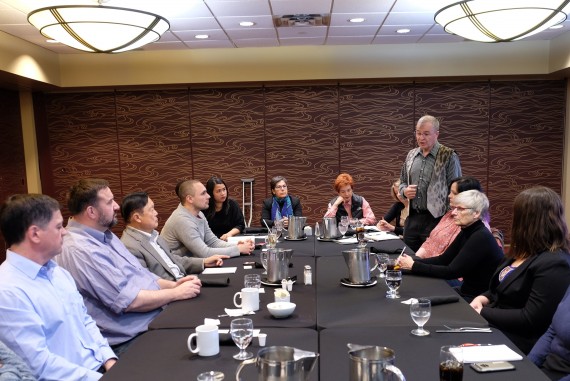
The special Senate committee on the Arctic completed a fact-finding tour across Nunavut and Nunavik on Wednesday and will take their findings to the federal government, in order to help create policy that reflects the needs of the Arctic.
The seven-member committee, which was struck in November 2017, met with businesses, individuals and organizations over the last week to learn about issues specific to the Arctic. These conversations covered a wide variety of topics, including infrastructure, internet, health care, housing, energy, tourism and water.
The committee is working to produce a report intended to complement the government’s work in developing a long-term vision for the Canadian Arctic.
Seven members of the committee travelled to Kuujjuaq, Iqaluit, Baker Lake, Cambridge Bay, Yellowknife, Inuvik and Whitehorse between Sept. 5 and Sept. 12. Although they planned to visit Nain, they were unable to fly there due to poor weather.
Dennis Patterson, Nunavut’s senator and the committee’s chair, said committee members learned about many unique challenges and opportunities in each community.
“Housing shortages and overcrowding are pivotal issues retarding economic development,” Patterson said in a telephone interview on Tuesday, Sept. 12, from the last leg of the tour, in Inuvik. “It came through loud and clear.”
Deputy Chair Patricia Bovey said the need for fibre optic internet connections in many places throughout the North stood out to her, “viscerally.”
A submission from the chamber of commerce that would typically take 20 minutes to send in the south took six days during their Arctic tour, she said.
Bovey said that through these community discussions on the tour, the committee also learned that improved access to health care and icebreakers were community priorities.
“Some communities only get deliveries once or twice a year,” Bovey said.
During their time in Iqaluit, the committee heard about education needs, water supply challenges and the potential for tourism. The committee spoke with the president of the Iqaluit Chamber of Commerce, representatives from Qulliq Energy Corp. and Nunavut Tourism, among others.
“We were so impressed with the Iqaluit airport and its art,” Bovey said, adding that since she has a background in visual arts she will speak about it when she returns home.
Senator Joseph Day, from New Brunswick, said the experience of touring the Arctic had been very educational for him. He was surprised by how advanced the infrastructure is in Inuvik compared to some other communities the committee visited.
“The roads are paved and there are sidewalks,” Day said. A taxi driver told him there are two gyms in the community, he added.
The senators also stayed at Agnico Eagle Mines Ltd.’s Meadowbank gold mine near Baker Lake, where Patterson said they learned about training programs that have contributed to the mine’s increase in Inuit employment.
Now that the tour is over, the committee is preparing a report on the government’s future Arctic policy framework.
Special committees have the power to make recommendations and the government is required to take them into account.
“When we go back to Ottawa and the Senate, we will be able to speak more knowledgeably to issues on the Arctic,” Patterson said.
“We are looking forward to helping the Canadian government create policies that reflect these issues on the ground.”
